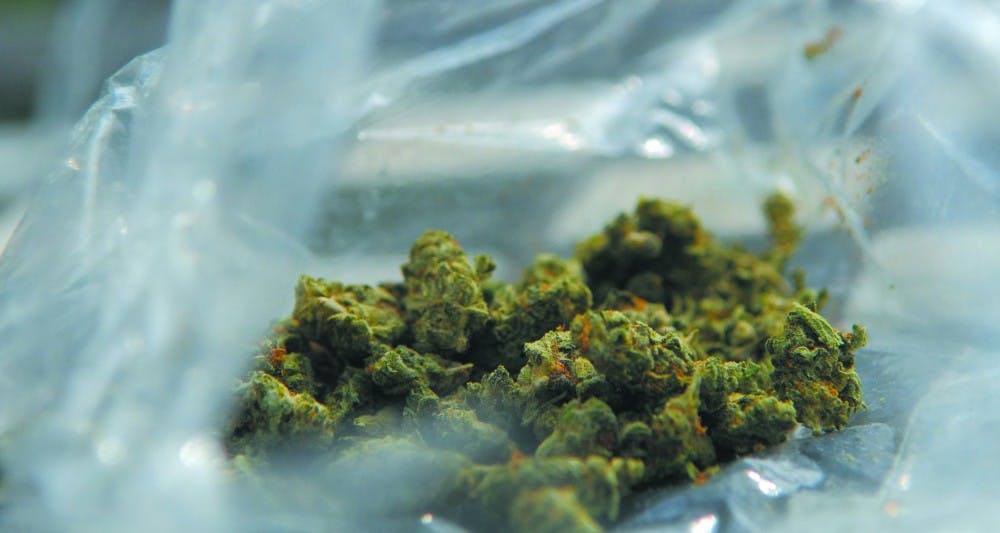The past month has brought a whirlwind of activity in laws surrounding the sale and consumption of marijuana: the state of Vermont passed a recreational marijuana bill, Attorney General Jeff Sessions allowed federal prosecutors to crack down on state marijuana programs, and Pennsylvania announced plans to open its first medical marijuana dispensary in late January.
But amid this atmosphere of change, Penn’s policies towards marijuana remain constant.
According to Director for the Office of Alcohol and Other Drug Program Initiatives Noelle Melartin, Penn's campus follows federal laws on marijuana in order to maintain federal funding. So unless marijuana becomes legal in accordance to federal law, it will continue to be a banned substance at Penn.
As outlined on the Vice Provost for University Life website, Penn follows the national Controlled Substances Act passed in 1970. The law states that distributing small amounts of marijuana could lead to a year in prison and/or a $5,000 fine. If distribution takes place on a college campus or within 1,000 feet of a campus, the penalties could double. Penalties could double or triple if the distribution is to a person under the age of 21.
Penn also has a specific University Alcohol and Drug Policy that includes expulsion as a possible consequence for violating the anti-drug campus policy, despite the fact that marijuana is decriminalized in Philadelphia.
“While there is a big variety of what’s happening across the country [with marijuana laws] in different states, institutions like universities fall under federal law,” Melartin said. “Certain things that are very central to the life of a university, such as financial aid and grant funding for research come from federal funding.”
As a University, Penn falls subject to the Drug-Free Schools and Communities Act Amendments of 1989 that decrees that schools who violate federal law with regards to drugs are at risk of losing federal funding. However, Inside Higher Ed reported that this threat to funding has never been formally implemented.
Federal law currently classifies marijuana as a Schedule 1 substance, according to Marcel Bonn-Miller, a Penn assistant professor of Psychology in Psychiatry. Bonn-Miller's research specializes in the potential for cannabis to be used as a treatment for individuals with Post-Traumatic Stress Disorder.
RELATED:
Philadelphia issues permits for dispensaries one year after medical marijuana was legalized
Legalization of medical marijuana efforts advance in Pennsylvania House
“The dichotomy has always been between the federal government and the states. The government has classified cannabis as a Schedule 1 substance, which means it is illegal and has no medical benefit,” Bonn-Miller said. “On the flip side, you have a growing number of states that are allowing it medicinally, with a number of those states also allowing its use recreationally.”
This dichotomy was brought to the forefront of national talks in the opening weeks of 2018, when Jeff Sessions terminated a policy that allowed states to legalize marijuana without fear of prosecution from the federal government.
Just weeks later, Vermont’s senate passed a bill legalizing recreational marijuana.
This move was welcomed by Julia Wenick, a freshman at the University of Vermont, who said she was pleased that the state legislators “seemed to be as liberal as the citizens” with regards to marijuana policy — even though UVM still prohibits the drug.
“With the legalization, I hope that the school and administration changes its attitude on marijuana,” Wenick said. “Right now, the school seems to care less about educating and more about making sure it’s not there at all.”
UVM officials have maintained their anti-marijuana stance and stated that they will continue to follow federal law, similar to Penn's stance after Philadelphia decriminalized the drug in 2014.
However, Wenick also expressed disappointment over Sessions’ recent announcement that the federal government could prosecute states that violate federal marijuana laws.
“That concerns me," Wenick said. "Law enforcement could redirect their energy into so many other things that are more worth their while."



